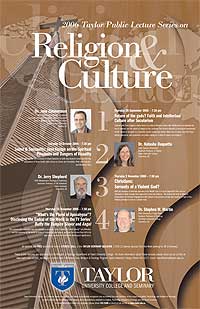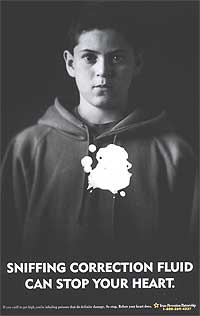 One of my responsibilities as Chair of the Religion & Theology Department at Taylor is to organize our annual fall lecture series. This lecture series touches on on some facet of the intersection of religion and culture. This fall we have an exciting line-up of speakers and topics.
One of my responsibilities as Chair of the Religion & Theology Department at Taylor is to organize our annual fall lecture series. This lecture series touches on on some facet of the intersection of religion and culture. This fall we have an exciting line-up of speakers and topics.
Dr. Jens Zimmerman, Associate Professor of English and Canada Research Chair in Religion, Culture, and Interpretation at Trinity Western University will be presenting on the “return of the gods� to contemporary culture and what that means for Christians. After emigrating to Canada from Germany in 1989, Dr. Zimmermann obtained his Ph.D. in Comparative Literature at the University of British Columbia. He has been a professor at Trinity Western University since 1998. His most recent publications are Recovering Theological Hermeneutics: An Incarnational-Trinitarian Approach to Interpretation (Baker Academic, 2004) and The Passionate Intellect: Incarnational Humanism and the Future of University Education (Baker Academic, 2006).
In addition, we have lectures by two Taylor professors. Dr. Natasha Duquette will be lecturing on the novels of Jane Austen as well as their film adaptations, while Dr. Jerry Shepherd will be addressing the controversial topic of violence and the Christianity — especially in light of the biblical portrayal of God as a violent deity. The series will be brought to close with another guest lecturer: Dr. Stephen W. Martin, Assistant Professor of Theology at the King’s University College in Edmonton, will be presenting on theology in the popular culture phenomenon of Joss Whedon’s television series Buffy the Vampire Slayer and Angel. Each lecture will include time for discussion and interaction. Consistent with the aims of our institution, we will explore these topics from a distinctively Christian perspective. In support of this event, we would greatly appreciate if you could promote these lectures.
The four lectures for this fall are:
Lecture 1: “Return of the gods? Faith and Intellectual Culture after Secularism� by Dr. Jens Zimmerman, Associate Professor of English and Canada Research Chair in Religion, Culture, and Interpretation, Trinity Western University, B.C. (Thursday, September 28, 7:30-9:00 pm).
Cultural critic Terry Eagleton claims there is a crisis in Western culture. Global pressures are forcing the West to think deeply about its past and future at a time when our cultural habits have deprived us of the ability to do so. Christian and secular thinkers alike are now prepared to denounce cultural relativism in search of a common humanity. Intellectuals are now proclaiming the end of atheism, indeed even of the secular university and are discussing the return of religion to the academy. This lecture describes and attempts a theological assessment of this “return of the gods” to a formerly secular intellectual culture. What does it mean for our culture and its institutions when the Pope, atheist statesmen, and academics are jointly calling for a return to values and religion?
Lecture 2: “Sense and Sensuality: Jane Austen on the Spiritual Pleasures and Dangers of Visuality� by Dr. Natasha Duquette, Assistant Professor of English, Taylor University College, Edmonton (Thursday, October 19, 7:30-9:00 pm)
This lecture will consider the treatment of visual dynamics both in Jane Austen’s novels and in the film adaptations of those novels, with a focus on Sense and Sensibility, Pride and Prejudice, and Mansfield Park. Representing her heroines as landscape connoisseurs, Austen satirizes the wildly dangerous sublime, sympathizes with the rudely cultivated picturesque, and finally conceives of her own spiritually contemplative sublime. After considering this progression through Austen’s texts, we will critically examine our own complicity in the pleasures and dangers of landscape aesthetics as we view Austen’s spectator characters on film.
Lecture 3: “Christians: Servants of a Violent God?� by Dr. Jerry Shepherd, Associate Professor of Old Testament, Taylor Seminary, Edmonton (Thursday, November 2, 7:30-9:00 pm)
With the increase in terrorism and war in the Middle East, it is more important than ever for Christians to think through their approach to war and violence. This lecture will look at different perspectives on Christian engagement with culture in discussions on war and violence, in light of the biblical portrayal of God as a violent deity.
Lecture 4: “‘What’s the Plural of Apocalypse’? Disclosing the End(s) of the World in the TV Series’ Buffy the Vampire Slayer and Angel� by Dr. Stephen W. Martin, Assistant Professor of Theology, The King’s University College, Edmonton (Thursday, November 16, 7:30-9:00 pm)
N.T. Wright has identified apocalyptic “as a way of investing space-time reality with its full, that is, its theological, significance.� Rather than denying the world, this reading suggests that apocalyptic affirms the world by saying “no� to the finality of evil. This lecture will investigate how two television programs, each created by “rabid atheist� Joss Whedon, see the meaning of the world in terms of impending apocalypse, and how the stories they tell in its light serve to invest the world with theological significance.
All lectures are FREE and will be held in Stencel Hall, in the Taylor Seminary Building, 11525-23 Avenue (access from the West parking lot off 23 Avenue).
I will be posting MP3s of the lectures on the Lecture website (which will be here eventually). I may even video record the lectures and post them on YouTube. For past lectures (including free downloadable MP3s), please go to the Public Lecture Archive page.


 My kids all go back to school next week, so naturally we have been getting together their school supplies for the year. Most of the items are standard: duotangs, paper, pens, pencils (HB pencils of course!), etc. What caught my eye, however, was a note on one of my kid’s supply list that White Out (aka
My kids all go back to school next week, so naturally we have been getting together their school supplies for the year. Most of the items are standard: duotangs, paper, pens, pencils (HB pencils of course!), etc. What caught my eye, however, was a note on one of my kid’s supply list that White Out (aka 